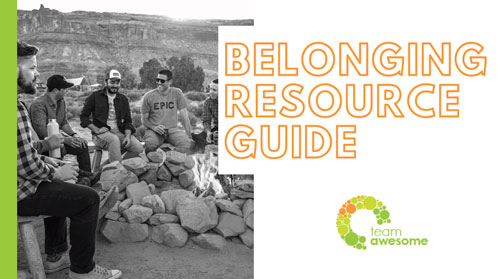In 2017, I hit a turning point. An existential crisis, if you will. I was a newly minted entrepreneur and I had a moment of reckoning to decide who I was, what I did, and how I wanted to do it. I enlisted the help of my coach to work through it, and she asked a number of critical, empowering questions.
The hardest question she ever asked me seemed easy enough, when in fact it required me to upend a life-long belief system and rewrite the world as I knew it. The question was this: “How do you define success?”
Wait, there is more than one way to define success?
Think about that for a moment. Have you ever consciously examined this before? I had not. I had never before questioned the definition that society gave me, that I pressured myself into, or that my parents imparted upon me. In one question, I moved from accepting the status quo to reexamining what was true for me.
How am I defining success right now?
When I contemplated this, I was defining it by production, money, a higher rung on a ladder, accomplishment, accolades. Bigger, better, more. That is success by the American definition. That was the way I was living my life. I would accomplish a new level, have a huge career success and feel really good about it! For about ten minutes. Then I would either return to a sense of fear that I hadn’t really earned it, I didn’t want others to find out I was a sham, or worst of all… it wasn’t that fulfilling and I was left with a dull nagging sense of “is this all there is?” Woof.
Call me crazy, but I didn’t really want bigger, better, or more of that. That’s like ordering a shit sandwich, or supersizing your shit sandwich with shit fries on the side. Yum.
What are some other ways to define it?
Other people might define success as balance. Or community impact. Or how they feel. Or that you enjoyed the journey and the outcome was irrelevant. There are literally endless ways you can define success.
Are they all valid?
Yes, of course. Is society’s definition that so many of us use also valid? YES. But it wasn’t true FOR ME.
How do I choose to define it now?
Every year I invoke a “word of the year” to guide my work and intentions. This year was going to be my year. I had done a LOT of rebuilding and I felt I *finally* had all of the ingredients that I needed for things to bloom. My bread was 90% baked, and all I needed was a tiny bit of yeast to spark the chemical reactions needed. 2020’s word of the year was “activation.”
I will not regurgitate a list of 101 reasons why 2020 is a bit of a dumpster fire. You know. You’re living it.
“Activation” is not happening. I spent over 6 months straight at home with my young children, which has left very little extra time or energy to activate anything other than a pint of Ben & Jerry’s Phish Food, or a subsequent Peloton ride to deal with said calorie count. I will activate some cool shit another day.
Instead the theme I have seen emerge repeatedly this year is to “push past what is comfortable.” In my workouts. In what I know about myself. In what just needs to be done for my family. In anti-racist work. In upholding democracy. I keep hearing the phrase push past what is comfortable. I like this theme just as much.
When I first had this conversation with myself about the definition of success back in 2017 (you can see it in my TEDx Talk), I settled on this as my own true definition:
Success would be creating something that alters the course of the world for the better.
Pushing past what is comfortable still aligns to that. I am still connected to my purpose.
I was having a “woe is me” moment the other day (one of many this year, honestly) about feeling like I wasn’t DOING enough. I wasn’t contributing as much as I usually do. And in a moment of clarity, I realized that I needed to give myself a bit of grace on how I viewed my “doing” in 2020. I gave a value to my “being” as well. In fact, this is work I have been trying to crack for a few years now. Finding value by just being, regardless of whether or not I do anything.
So if I were to live in grace and measure 2020 as a success, what would be the measuring stick?
…[long pause]…I’ve got it.
I am invoking an old quote from the 1996 musical, RENT, here (an all-time favorite of mine) but it is the only answer that feels right for my 2020.
Measure in love.
I think back to all of the amazing time I have spent with my two young children.
The things they have learned with me as their teacher.
Things they have taught me.
Working together as a family unit to navigate one thousand new and complex decisions.
Taking responsibility over and over again to speak up for humanity.
If I measure in love, then damn, we crushed it.
The way we define success and measure it can change over time. In fact, they probably should. If your definition of success needs to change for the time being given the current circumstances, then DO IT. Then pick a new one when the season changes. Nothing is a life sentence here.
In this season, I pick love. Give yourself permission to do the same.
Seasons of Love
Five hundred twenty-five thousand
Six hundred minutes
Five hundred twenty-five thousand
Moments so dear
Five hundred twenty-five thousand
Six hundred minutes
How do you measure – measure a year?
In daylights – in sunsets
In midnights – in cups of coffee
In inches – in miles
In laughter – in strife
In – five hundred twenty-five thousand
Six hundred minutes
How do you measure
A year in the life
How about love?
Measure in love
– RENT, Jonathan Larson
About the author:
Katie Rasoul is a keynote speaker, writer, leadership coach and Chief Awesome Officer for Team Awesome, a leadership coaching and culture consulting firm. She is a TEDx speaker alumna, author of the best-selling book, Hidden Brilliance: A High-Achieving Introvert’s Guide to Self-Discovery, Leadership and Playing Big, and co-host of The Life and Leadership Podcast.
To learn more about Katie’s signature keynote talk “Belonging: The Extraordinary Factor of Organizations with Humanity and Heart” visit www.katierasoul.com.



Recent Comments